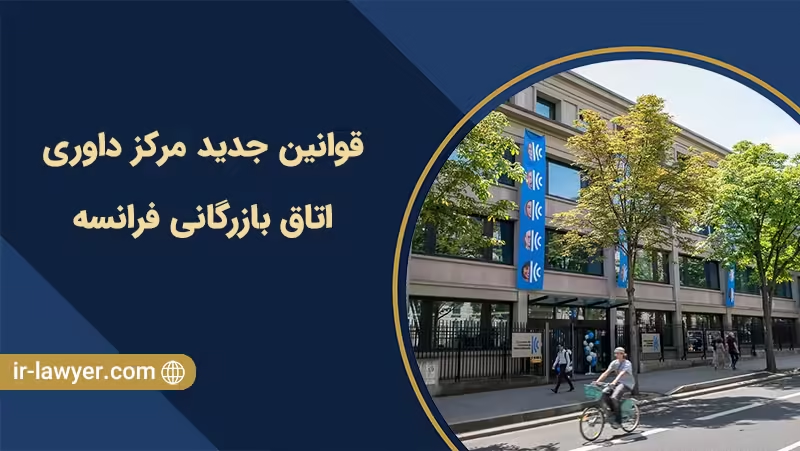
اجرای حکم خارجی
اینجانب خلیل آسایش با آشنایی و اطلاع از مقررات حقوقی بین المللی و سالها تجربه و انجام امور وکالت در زمینه داوری بین المللی در اتاق بازرگانی بین المللی فرانسه ( پاریس ) و مرکز داوری بین المللی برلین (ICC) بصورت مستقیم و اجرای آرا خارجی در دادگاه های داخلی و خارجی از جمله (، امارات متحده عربی و عمان…) آماده ارائه خدمات حقوقی می باشم.
اصلاح قوانین داوری ICC
14/11/2020 توسط داوری بین المللی
بر 8 اکتبر 2020, این ICC نسخه اصلاح شده غیر رسمی قوانین داوری خود را منتشر کرد (“2021 قوانین ICC“). The متن پیش نویس 2021 قوانین ICC قبل از آغاز رسمی انتشار آن در دسامبر ، تحت اصلاحات تحریریه باقی می ماند 2020.
The 2021 قوانین ICC از تاریخ اجرا خواهد شد 1 ژانویه 2021 و برای کلیه داوریهای ICC اعمال می شود که از تاریخ یا بعد از آن تاریخ شروع می شود, صرف نظر از اینکه زمینه ای توافقنامه داوری نتیجه گیری شد, مگر اینکه طرفین “توافق کرده اند که از تاریخ توافق نامه داوری خود را به مقررات ارائه دهند” (مقاله 6(1) از 2021 قوانین ICC). نسخه قبلی قوانین داوری ICC, در حال حاضر, هست 2017 قوانین داوری (“2017 قوانین“), که به طور پیش فرض برای داوری های ICC که قبلاً ثبت شده اند اعمال می شود 1 ژانویه 2021.
مهمترین تغییرات در 2021 قوانین ICC شامل نیاز به افشای ترتیبات بودجه شخص ثالث است, گسترش اختیارات دادگاه برای صدور پیوست, ادغام و جوایز اضافی, مقدمه ای از مقررات خاص برای تأمین داوری های معاهده سرمایه گذاری, افزایش استفاده از وسایل ارتباطی الکترونیکی, و همچنین دامنه کاربرد گسترده قوانین رویه تسریع شده.
هیچ افزایش در هزینه های داوری تحت 2021 قوانین ICC (یک ماشین حساب آنلاین هزینه ICC است در اینجا موجود است), که سلامتی است. در مورد مواردی که اخیراً تجدید نظر شده است ، این مورد نیست 2020 قوانین داوری LCIA و 2020 برنامه LCIA از هزینه های داوری, که در موثر واقع شد 1 اکتبر 2020, افزایش هزینه های داوری LCIA توسط 10% به 12,5%, در میان تغییرات قابل توجه دیگر, که مورد بحث قرار می گیرد اینجا.
اصلاحات اساسی در 2021 قوانین ICC در زیر با جزئیات بیشتر مورد بحث قرار می گیرد.
وظیفه جدید برای افشای سرمایه گذاران شخص ثالث
علاوه بر این مهم است 2021 قوانین ICC, با هدف افزایش شفافیت دادرسی ICC, پاراگراف است 7 از مقاله 11, که جدیدی را تحمیل می کند, وظیفه صریح در قبال طرفین برای افشای هرگونه توافق نامه تأمین مالی شخص ثالثی که منعقد کرده اند.
مقاله جدید 11(7) از 2021 قوانین ICC
“به منظور کمک به داوران و داوران احتمالی در انجام وظایف خود تحت مواد 11(2) و 11(3), هر یک از طرفین باید بلافاصله دبیرخانه را مطلع سازند, دادگاه داوری و طرفین دیگر, وجود و هویت هر شخص غیر طرفی که ترتیبی برای تأمین بودجه ادعاها یا دفاعیات منعقد کرده است و تحت آن منافع اقتصادی در نتیجه داوری دارد.” (تأکید اضافه شده است)
در طول سالهای گذشته, بحث داغی در مورد افشای توافق نامه های مالی شخص ثالث در داوری بین المللی (یک راهنمای مفید برای به دست آوردن شخص ثالث در کارهای داوری بین المللی است در اینجا موجود است). قوانین داوری, و همچنین قوانین ملی, قبلاً در این مورد سکوت می کردند, گرچه می تواند تعارض منافع ایجاد کند. موضوع دیگه این نیست.
قابل توجه است که 2014 دستورالعمل IBA در مورد تضاد منافع در داوری بین المللی همچنین به مسئله افشای توافق نامه های بودجه شخص ثالث تحت زمینه بی طرفی و استقلال داوران بپردازید, قرار دادن سرمایه گذاران و بیمه گران شخص ثالث در همان سطح احزاب با “علاقه مستقیم اقتصادی به این رای.“
توضیح در مورد استاندارد عمومی 6(ب) از 2014 دستورالعمل IBA در مورد تضاد منافع در داوری بین المللی
[…] “سرمایه گذاران و بیمه گذاران شخص ثالث در رابطه با اختلاف ممکن است علاقه مستقیمی به این رای داشته باشند, و به همین ترتیب ممکن است معادل حزب در نظر گرفته شود. برای این اهداف, اصطلاحات “سرمایه گذار شخص ثالث” و “بیمه گر” به هر شخص یا نهاد دیگری که بودجه کمک می کند اشاره دارد, یا پشتیبانی مادی دیگر, به دادرسی یا دفاع از این پرونده و منافع اقتصادی مستقیمی در آن وجود دارد, یا وظیفه تأدیه طرف برای, رایی که در داوری اعطا می شود.” (تأکید اضافه شده است)
جویندگان احزاب اضافی
The 2021 قوانین ICC همچنین به این نتیجه تغییر می کند که پیوستن به احزاب اضافی کمتر سنگین شده است, به منظور تهیه پیچیده, داوری های چند طرفه و چند قراردادی, همانطور که مورد است, مثلا, در اختلافات ساختمانی, که غالباً با داوری حل می شوند.
طبق ماده 7(1) از 2017 قوانین, هیچ حزب دیگری نمی تواند عضو شود “پس از تأیید یا انتصاب هر داوری, مگر اینکه همه طرفین, از جمله طرف اضافی, در غیر این صورت موافق[د].پاراگراف تازه وارد شده 5 از مقاله 7 از 2021 قوانین ICC اجازه می دهد تا تقاضای پیوستن شخص ثالث انجام شود حتی پس از تأیید یا تعیین داور, اگر دادگاه داوری در این باره تصمیمی اتخاذ کند, با در نظر گرفتن “همه شرایط مربوطه“, و طرف اضافی اساسنامه دادگاه را می پذیرد و با شرایط مرجع موافقت می کند, در صورت امکان.
این بدان معنی است که پیوستن به احزاب اضافی اکنون در طول داوری امکان پذیر است, حتی وقتی طرفین داوری اختلاف نظر داشته باشند, تا زمانی که دادگاه داوری درخواست پیوستن را بپذیرد و شخص ثالث رضایت خود را برای پیوستن به داوری اعلام کند.
“شرایط مربوطه”توسط دادگاه داوری در نظر گرفته شود, در تصمیم گیری در مورد مناسب بودن پیوستن, عبارتند از prima facie صلاحیت طرف اضافی, زمان پاسخ دادن, تعارض احتمالی منافع, و همچنین تأثیر وصال در رویه داوری.
مقاله جدید 7(5) از 2021 قوانین ICC
“هرگونه درخواست Joinder پس از تأیید یا تعیین هر داوری انجام می شود توسط دادگاه داوری تصمیم گیری می شود یک بار تشکیل شده است و منوط به پذیرش طرف اضافی خواهد بود قانون اساسی دیوان داوری و موافقت با شرایط مرجع, در صورت امکان. در تصمیم گیری در مورد چنین درخواستی برای پیوستن, دادگاه داوری کلیه شرایط مربوط را در نظر خواهد گرفت, که ممکن است شامل این باشد که آیا دادگاه داوری صلاحیت رسیدگی اولیه به طرف اضافی را دارد یا خیر, زمان درخواست Joinder, تعارض احتمالی منافع و تأثیر پیوستن در رویه داوری. هرگونه تصمیم برای پیوستن به یک طرف اضافی ، هیچ تعارضی به تصمیم دادگاه داوری در مورد صلاحیت آن در مورد آن طرف ندارد.” (تأکیدات اضافه شده است)
تحکیم داوری
مقاله 10(ب) مورد تجدید نظر قرار گرفته است تا در آنجا “کلیه ادعاهای موجود در داوریها طبق همان قرارداد داوری مطرح می شود یا توافقات.“در حالی که کلمات ایده آل نیستند, آی تی با هدف اجازه دادن به “ادغام پرونده ها در حضور احزاب مختلف“, به عنوان ICC توضیح می دهد. این همچنین به سردرگمی قبلی از نظر اینکه آیا ادغام در مواردی که ادعاهای داوری تحت بیش از یک توافق داوری صورت گرفته امکان پذیر است, که غالباً اتفاق می افتد. متن به روز شده مقاله 10(ج) همچنین توضیح می دهد که در مورد ادعاهایی که “تحت توافق نامه داوری یا توافق نامه های مشابه ساخته نشده است.“
مقاله جدید 10 از 2021 قوانین ICC
“دادگاه ممکن است, به درخواست یک مهمانی, ادغام دو یا چند داوری در انتظار طبق داوری در یک داوری واحد, جایی که:
آ) احزاب توافق کردند که به تحکیم بپردازند; یا
ب) کلیه ادعاهای موجود در داوریها طبق همان قرارداد داوری مطرح می شود یا توافقات; یا
ج) the claims in the arbitrations ساخته نشده اند تحت همان قرارداد داوری یا توافق نامه ها, اما داوری ها بین طرفین یکسان است, اختلافات در داوریها در رابطه با همان رابطه حقوقی بوجود می آید, و دادگاه می داند که توافق نامه های داوری سازگار است.“ (تأکیدات اضافه شده است)
مقاله قدیمی 10 از 2017 قوانین ICC
“دادگاه ممکن است, به درخواست یک مهمانی, ادغام دو یا چند داوری در انتظار طبق داوری در یک داوری واحد, جایی که:
آ) احزاب توافق کردند که به تحکیم بپردازند; یا
ب) کلیه ادعاهای موجود در داوریها طبق همان قرارداد داوری مطرح می شود; یا
ج) که در آن ادعا در داوری تحت بیش از یک توافقنامه داوری انجام می شود, داوری ها بین همین احزاب است, اختلافات در داوریها در رابطه با همان رابطه حقوقی بوجود می آید, و دادگاه می داند که توافق نامه های داوری سازگار است.
در تصمیم گیری در مورد ادغام, دادگاه ممکن است هر شرایطی را که مناسب می داند در نظر بگیرد, از جمله اینکه یک یا چند داور در بیش از یکی از داوری ها تأیید یا منصوب شده باشند, اگر چنین باشد, اعضا یا افراد مختلف تأیید شده اند یا منصوب شده اند.” (تأکید اضافه شده است)
این اصلاحات مطابق با تغییرات اخیر مقررات تلفیق در قوانین داوری تجدید نظر شده LCIA, که قدرت دادگاه داوری و دادگاه LCIA را در امر ادغام در مواردی که طرفین یکسان نیستند ، گسترش داد, اما اختلافات آنها ناشی از معاملات مشابه یا مشابه است (2020 قوانین داوری LCIA, مقالات 22.7 و 22.8).
قدرت دادگاه ICC برای تعیین داوران با وجود توافق طرفین
یکی دیگر از موارد قابل توجه دیگر به 2021 قوانین ICC پاراگراف است 9 از مقاله 12 (قانون اساسی دیوان داوری) که به دادگاه ICC اختیار می دهد “در شرایط استثنایی“برای تعیین اعضای دادگاه داوری بدون در نظر گرفتن”هرگونه توافق طرفین در مورد روش تشكیل دادگاه داوری“.
با توجه به اینكه یكی از معدود دلایلی كه موجب می شود رای داوری به موجب آن رد شود ، این یك جاه طلبی است 1958 کنوانسیون نیویورک, ماده پنجم(1)(د) جایی است که “ترکیب مرجع داوری […] مطابق توافق طرفین نبود“.
باید دید دادگاه ICC چگونه تفسیر می کند, در عمل, تعریف نشده “شرایط استثنایی“برای توجیه انحراف از توافق طرفین در مورد روش قانون اساسی دیوان داوری, بدون اینکه رای حاصله را در معرض موانع قابل اجرا قرار دهد.
The نظرات ICC از این نظر هدف این ماده اجازه دادگاه ها است “به توافق نامه های داوری بی وجدان که ممکن است اعتبار رای را به خطر بیاندازند ، نادیده گرفته شود“, در نتیجه از یکپارچگی مراحل داوری محافظت می شود.
مقاله جدید 12(9) از 2021 قوانین ICC
“با وجود توافق طرفین در مورد روش تشكیل دادگاه داوری, در شرایط استثنایی ، دادگاه می تواند برای جلوگیری از خطر قابل توجهی در برخورد نابرابر و ناعادلانه که ممکن است بر اعتبار رای صادره تأثیر بگذارد ، هر یک از اعضای دادگاه داوری را تعیین کند.“
مقررات مربوط به داوری های پیمان سرمایه گذاری
مطابق با 2019 آمار حل اختلاف ICC (در اینجا موجود است برای بارگیری), “از آنجا که 1996, وقتی اولین مورد BIT ثبت شد, به روز, ICC اجرا کرده است 42 موارد مبتنی بر BIT.”علی رغم اینکه اختلافات سرمایه گذاری نسبتاً کمی را طی سالهای گذشته اداره کرده است, ICC دو اصلاحیه در آن ایجاد کرد 2021 قوانین ICC صریحاً به اختلافات ناشی از معاهدات اشاره می کند.
اولین, مقاله 13(6) از 2021 مقررات ICC مستلزم تعیین داورانی است که تابعیت مشابه هر یک از طرف های داوری را ندارند ، هنگامی که “توافق داوری که داوری بر اساس آن بنا شده از یک معاهده ناشی می شود“.
مقاله جدید 13(6) از 2021 قوانین ICC
“هرگاه توافقنامه داوری که داوری بر اساس آن بنا شده از یک معاهده ناشی شود, و مگر اینکه طرفین خلاف آن توافق کنند, هیچ داوری تابعیت یکسانی از طرف داوری را نخواهد داشت.“
دومین, مقاله 29(6)(ج) از 2021 ICC Rules excludes the use of emergency arbitration where “توافق داوری که بر اساس آن درخواست صورت گرفته از یک معاهده ناشی می شود.“به نظر می رسد دلیل اصلی این استثنا این باشد که مهلت های محدود مقرر در طرح داوری اضطراری ICC برای دولت ها یا نهادهای دولتی که درگیر اختلافات سرمایه گذاری هستند غیرقابل اجرا خواهد بود., که یک نگرانی معتبر است.
مقاله جدید 29(6) از 2021 قوانین ICC
“مقررات داوری اضطراری در صورت عدم استفاده از آن اعمال می شود: آ) پیش از این توافقنامه داوری طبق مقررات منعقد شده بود 1 ژانویه 2012; ب) طرفین توافق کردند که از مفاد داوری اضطراری خودداری کنند; یا ج) توافق داوری که بر اساس آن درخواست صورت گرفته از یک معاهده ناشی می شود.” (تأکید اضافه شده است)
نمایندگی احزاب – به استثنای مشاور جدید برای جلوگیری از تضاد منافع
مقاله 17 از 2021 قوانین ICC اکنون به سه بند تقسیم شده است, دو مورد اول اضافات جدید و آخرین مورد شامل آنچه بود, زیر 2017 قوانین, کل مقاله 17.
پاراگراف 1 وظیفه صریح طرفین را برای اطلاع سریع همه شرکت کنندگان در داوری تحمیل می کند, یعنی, دبیرخانه ICC, دادگاه داوری و طرفین, از هر گونه تغییر در نمایندگی آن. این نشان دهنده آنچه در حال حاضر معمول است.
پاراگراف 2 شامل یک تغییر قوی تر است, اختیار دادن به دیوان داوری برای استثنا کردن مشاور جدید یا اقدامات مناسب دیگر در صورت تعارض منافع, با هدف محافظت از یکپارچگی دادرسی (و جلوگیری از نیاز به تغییر دادگاه های داوری در صورت تغییر طرف مشاور از طرف).
مقاله جدید 17 از 2021 قوانین ICC (نمایندگی حزب)
“1) هر یک از طرفین باید بلافاصله دبیرخانه را مطلع سازند, دادگاه داوری و سایر طرفین از هرگونه تغییر در نمایندگی خود.
2) دادگاه داوری ممکن است, به محض تشكیل و پس از آن كه فرصتی به طرفین داد تا در مدت زمان مناسب كتبا اظهارنظر كنند, هرگونه اقدام لازم را برای جلوگیری از تضاد منافع داور ناشی از تغییر در نمایندگی حزب انجام دهید, از جمله طرد نمایندگان جدید حزب از شرکت به طور کامل یا جزئی در دادرسی داوری.
3) در هر زمان پس از شروع داوری, دادگاه داوری یا دبیرخانه ممکن است به اثبات اقتدار نمایندگان هر حزب احتیاج داشته باشد.” (تأکید اضافه شده است)
مقاله قدیمی 17 از 2017 قوانین (اثبات اقتدار)
“در هر زمان پس از شروع داوری, دادگاه داوری یا دبیرخانه ممکن است به اثبات اقتدار نمایندگان هر حزب احتیاج داشته باشد.“
قوانین رویه سریع
پیوست ششم, مقاله 1(2) از 2021 آیین نامه ICC دامنه کاربرد مقررات داوری محبوب سریع را گسترش می دهد (مقاله 30 و پیوست ششم) با افزایش آستانه برنامه انصراف از USD 2 میلیون دلار 3 میلیون.
پیوست ششم, مقاله 1(2) از 2021 قوانین ICC
“مبلغی که در مقاله ذکر شده است 30(2), بند الف) از قوانین است: من) دلار امریکا$ 2,000,000 اگر قرارداد داوری طبق قوانین در تاریخ یا بعد از آن منعقد شده باشد 1 مارس 2017 و قبل از آن 1 ژانویه 2021 یا ii) دلار امریکا$ 3,000,000 اگر قرارداد داوری طبق قوانین در تاریخ یا بعد از آن منعقد شده باشد 1 ژانویه 2021.” (تأکید اضافه شده است)
اولویت ارتباطات و ارسال های الکترونیکی
طبق ماده 3(1) از 2021 قوانین ICC, قانون پیش فرض اکنون این است که “تمام ادعاها و سایر ارتباطات کتبی“به”برای هر طرف ارسال شود, هر داور, و دبیرخانه”از طریق ابزارهای الکترونیکی, در حالیکه, زیر 2017 قوانینی که باید “عرضه شده در تعدادی از [سخت] نسخه های کافی برای تهیه یک نسخه برای هر طرف, به علاوه یک نفر برای هر داور, و یکی برای دبیرخانه.“
مقاله جدید 3(1) از 2021 قوانین ICC
“ذخیره کنید در غیر این صورت در مقالات ارائه شده است 4(4)(ب) و 5(3), تمام ادعاها و سایر ارتباطات کتبی ارسال شده توسط هر طرف, و همچنین تمام اسناد ضمیمه آن, برای هر یک از طرفین ارسال می شود, هر داور, و دبیرخانه. هرگونه اطلاع رسانی یا ارتباط از طرف دادگاه داوری به طرفین نیز باید به صورت کپی به دبیرخانه ارسال شود.” (تأکیدات اضافه شده است)
مقاله قدیمی 3(1) از 2017 قوانین ICC
“تمام ادعاها و سایر ارتباطات کتبی ارسال شده توسط هر طرف, و همچنین تمام اسناد ضمیمه آن, تعداد کپی های کافی برای تهیه یک نسخه برای هر طرف تهیه می شود, به علاوه یک نفر برای هر داور, و یکی برای دبیرخانه. نسخه ای از هرگونه ابلاغیه یا ارتباطات از طرف دادگاه داوری به طرفین به دبیرخانه ارسال می شود.” (تأکیدات اضافه شده است)
بر این اساس, این 2021 قوانین ICC مقاله را جابجا کرد 4(4)(آ) از 2017 قوانینی که براساس آنها درخواست داوری باید به صورت پیش فرض در نسخه های چاپی به همه طرف های درگیر ارائه شود. طبق ماده 4(4)(ب) از 2021 قوانین ICC, نسخه های چاپی اکنون فقط “جایی که مدعی درخواست ارسال درخواست را از طریق تحویل در مقابل دریافت درخواست می کند, پست یا پیک ثبت شده.“
مقاله جدید 4(4) از 2021 قوانین ICC
“همراه با درخواست, مدعی باید:
آ) پرداخت هزینه تشکیل پرونده مورد نیاز پیوست III را انجام دهید (“هزینه ها و هزینه های داوری”) در تاریخ ارسال درخواست درخواست شده است; و
ب) تعداد کافی نسخه از درخواست را برای طرف دیگر ارسال کنید, هر داور و دبیرخانه جایی که مدعی درخواست ارسال درخواست را از طریق تحویل در مقابل دریافت درخواست می کند, پست یا پیک ثبت شده.” (تأکید اضافه شده است)
مقاله قدیمی 4(4) از 2017 قوانین ICC
“همراه با درخواست, مدعی باید:
آ) تعداد نسخه های مورد نیاز آن را ارسال کنید 3(1); و
ب) پرداخت هزینه تشکیل پرونده مورد نیاز پیوست III را انجام دهید (“هزینه ها و هزینه های داوری”) در تاریخ ارسال درخواست درخواست شده است.” (تأکید اضافه شده است)
به همین ترتیب, تحت ماده اصلاح شده 5(3) از 2021 قوانین ICC, نسخه های چاپی پاسخ به درخواست داوری به طور پیش فرض دیگر لازم نیست, اما تنها “جایی که مخاطب درخواست انتقال آن را از طریق تحویل در مقابل دریافت دارد, پست یا پیک ثبت شده.“
این اصلاحات سازگار با عصر جدید دیجیتال است, با هدف کاهش هزینه های چاپ و حمل غیر ضروری و سازگارتر با محیط زیست.
شنوایی های مجازی
مقاله اصلاح شده 26(1) از 2021 قوانین ICC به صراحت امکان برگزاری را معرفی می کند جلسات مجازی, که در طی پاندمی کووید 19. در عبارت جدید بیشتر روشن شده است که جلسه دادرسی لزوماً برگزار نمی شود, مگر اینکه هر طرف درخواست کند, یا اگر دادگاه داوری ضروری بداند. این تغییر با یادداشت ICC در مورد اقدامات احتمالی با هدف کاهش اثرات بیماری همه گیر Covid-19, که فراهم می کند, از جمله, راهنمایی در مورد تشکیل جلسات دادرسی مجازی.
مقاله جدید 26(1) از 2021 قوانین ICC
“در صورت درخواست هر یک از طرفین ، دادرسی برگزار می شود, عدم چنین درخواستی, اگر دادگاه داوری به خواست خود تصمیم به استماع طرفین بگیرد. وقتی قرار است جلسه رسیدگی برگزار شود, دادگاه داوری, اعلام منطقی, احزاب را احضار می کند تا در روز و در محلی که توسط آن تعیین شده است ، در جلوی آن حضور پیدا کنند. دادگاه داوری می تواند تصمیم بگیرد, بعد از مشورت با طرفین, و بر اساس حقایق و شرایط مربوطه, که هرگونه شنوایی با حضور فیزیکی یا از راه دور با کنفرانس ویدیویی انجام می شود, تلفن یا سایر وسایل ارتباطی مناسب.” (تأکیدات اضافه شده است)
مقاله قدیمی 26(1) از 2017 قوانین ICC
“وقتی قرار است جلسه رسیدگی برگزار شود, دادگاه داوری, اعلام منطقی, احزاب را احضار می کند تا در روز و در محلی که توسط آن تعیین شده است ، در جلوی آن حضور پیدا کنند.“
رای اضافی
یکی دیگر از مقررات تازه وارد شده تحت این 2021 قوانین ICC, مقاله 36(3), به طرفین اجازه می دهد تا تقاضای خود را انجام دهند, در داخل 30 روز از دریافت رای, برای یک رای اضافی در مورد ادعاهایی که دادگاه داوری تصمیم گیری نکرده است. به طرف دیگر اعطا می شود “آ محدودیت زمانی کوتاه, به طور معمول بیش از حد نیست 30 روزها”برای اظهار نظر در مورد برنامه رای اضافی, قبل از اینکه دادگاه تصمیم خود را بگیرد.
طبق مقررات 2o17 چنین مقرره ای وجود ندارد, مگر اینکه قانون صندلی حکمی را مجاز به مجازات اضافی کند, طرفین مجبور شدند برای مواردی که قبلاً توسط دادگاه داوری ICC حذف شده بودند ، داوری کاملاً جدید ارائه دهند. ریسک, البته, این است که احزاب درخواست های غیرمنتظره ای را برای جوایز اضافی ارائه می دهند.
مقاله جدید 36(3) از 2021 قوانین ICC
“هر کاربرد یک مهمانی برای یک رای اضافی در مورد ادعاهای مطرح شده در دادرسی داوری که دیوان داوری در تصمیم گیری خود قید کرده است باید به دبیرخانه ارائه شود در داخل 30 روزهای دریافت بیدارد توسط چنین مهمانی. پس از انتقال درخواست به دادگاه داوری, طرف دوم مهلت کوتاه به طرف یا طرف های دیگر می دهد, به طور معمول بیش از حد نیست 30 روزها, از دریافت درخواست توسط آن طرف یا طرفین, برای ارائه هر گونه نظر در مورد آن. دادگاه داوری تصمیم خود را در مورد درخواست به صورت پیش نویس به دادگاه ارسال می کند حداکثر پس از آن 30 روز پس از انقضا زمان محدودیت زمانی برای دریافت هرگونه نظر از طرف دیگر یا در مهلت دیگری که دادگاه می تواند تصمیم بگیرد.” (تأکیدات اضافه شده است)
مقاله 2(v) از 2021 قوانین ICC بر این اساس اصلاح می شود تا این تغییر را منعکس کند: عبارت ““رای” شامل, از جمله, موقت, جزئي, نهایی, یا اضافی رای.”
قانون حاکم و حل و فصل اختلافات
یکی دیگر از موارد جدید اضافه شده به 2021 قوانین ICC یک مقاله است 43, که پیش بینی می کند هرگونه اختلاف ناشی از یا در ارتباط با اداره دادرسی داوری توسط دادگاه “توسط قانون فرانسه اداره می شود و توسط دادگاه قضایی پاریس تسویه می شود (دادگاه قضایی پاریس) در فرانسه“, که اعطا می شود “صلاحیت انحصاری.“چنین نسخه ای در نسخه های قبلی یافت نمی شود. بعید نیست که ICC با احزاب بازنده ، مورد شکایت قرار گیرد. این به دادگاه بین المللی کیفری اجازه می دهد تا در یک حوزه قضایی واحد از خود دفاع کند, که ترجیح داده می شود تا مجبور نشود هزینه های زیادی از دعاوی گاهی جعلی را به کاربران داوری ICC منتقل کند.
مقاله جدید 43 از 2021 قوانین ICC
“هرگونه ادعایی که ناشی از یا در ارتباط با اداره مراحل داوری توسط دیوان طبق مقررات باشد ، تحت قانون فرانسه قرار دارد و توسط دادگاه قضایی پاریس تسویه می شود (دادگاه قضایی پاریس) در فرانسه, که صلاحیت انحصاری خواهد داشت.“
The 2020 قوانین داوری LCIA اخیراً مقرره مشابهی را ارائه داده اند, مقاله 31.3, که صلاحیت انحصاری دادگاه دادگاههای انگلیس و ولز را برای رسیدگی و تصمیم گیری در مورد هرگونه فعالیتی به آنها می دهد, دادخواست یا دادرسی ناشی از داوری های تحت اداره LCIA.
* * *
در مجموع, اصلاحاتی که توسط 2021 قوانین داوری کارایی کلی را افزایش می دهد, انعطاف پذیری و شفافیت داوری های ICC, و همچنین کدگذاری روندهای اخیر در داوری بین المللی, مانند افزایش استفاده از ارتباطات الکترونیکی و شنودهای مجازی. از این تغییرات استقبال می شود.
درباره خلیل آسایش:
اینجانب خلیل آسایش عضو کانون وکلای تهران با آشنایی و اطلاع از مقررات حقوق تجارت بین الملل و سابقه انجام امور وکالت در اتاق داوری بین المللی پاریس و برلین “international chamber of commerce” و همچنین اجرای آرا قضایی در دادگاه های داخلی و خارجی از جمله ( ترکیه، امارات متحده عربی، عمان و ..) آماده ارائه خدمات حقوقی می باشم.
توافق نامه داوری بین المللی, رای داوری بین المللی, هزینه داوری اتاق بازرگانی ICC, اطلاعات داوزی ICC داوری, وکیل داوری بین المللی, خلیل آسایش داوری بین المللی ICC , قوانین داوری ICC, مرکز داوری پاریس ICC, وکیل پرونده داوری بین المللی, داوری ICC, وکیل ایرانی مرکز داوری فرانسه ICC, میانجیگری بین المللی, صلاحیت مرکز داوری اتاق بازرگانی پاریس ICC, داوری مالی, داوری UNCITRAL




